DAWN
Daily Arts Web Nucleus
Discover the Arts! Each day a different image from the Literary, Performing, or Visual Arts representing a portion of Scripture plus an explanation with links 2017 February 12
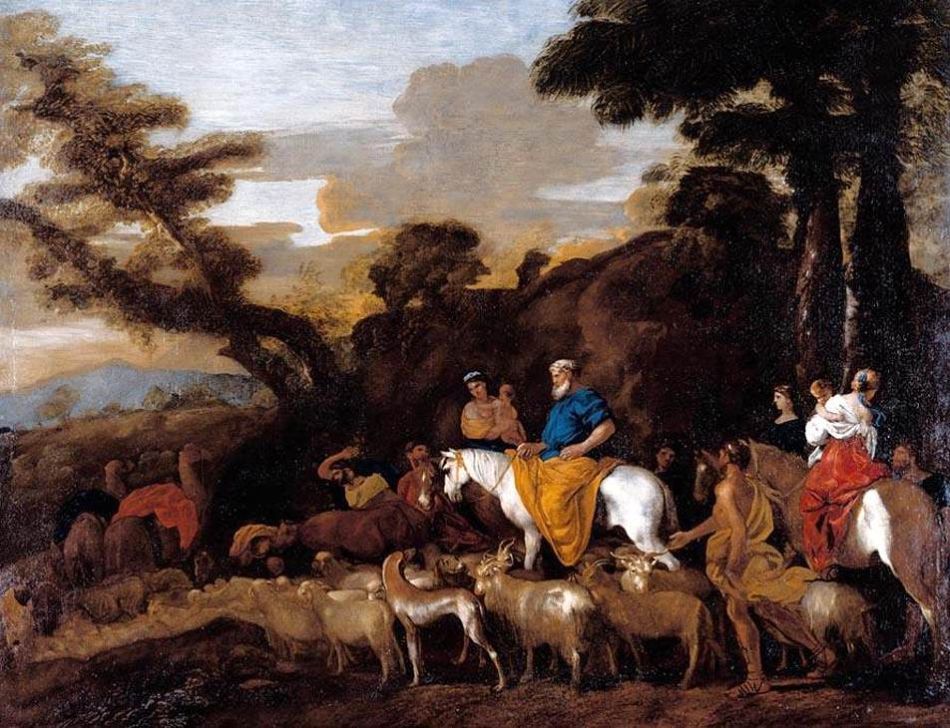
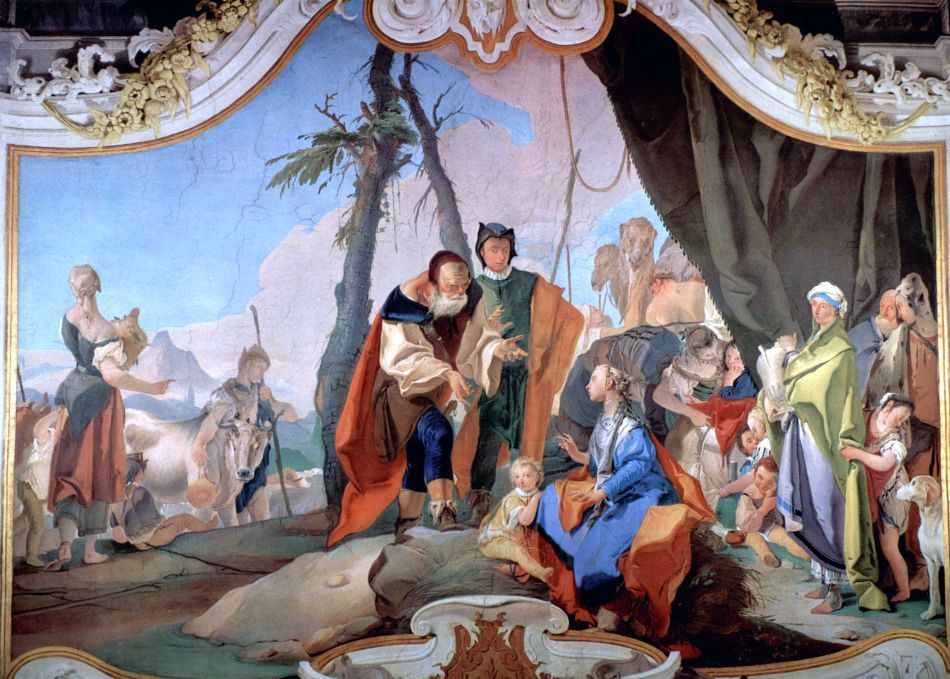
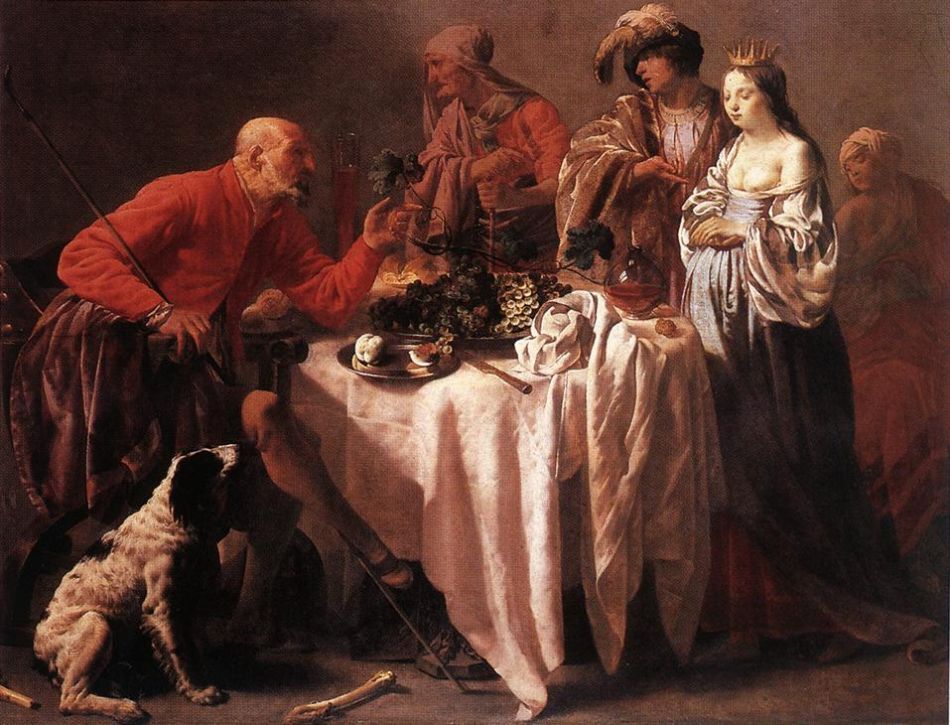
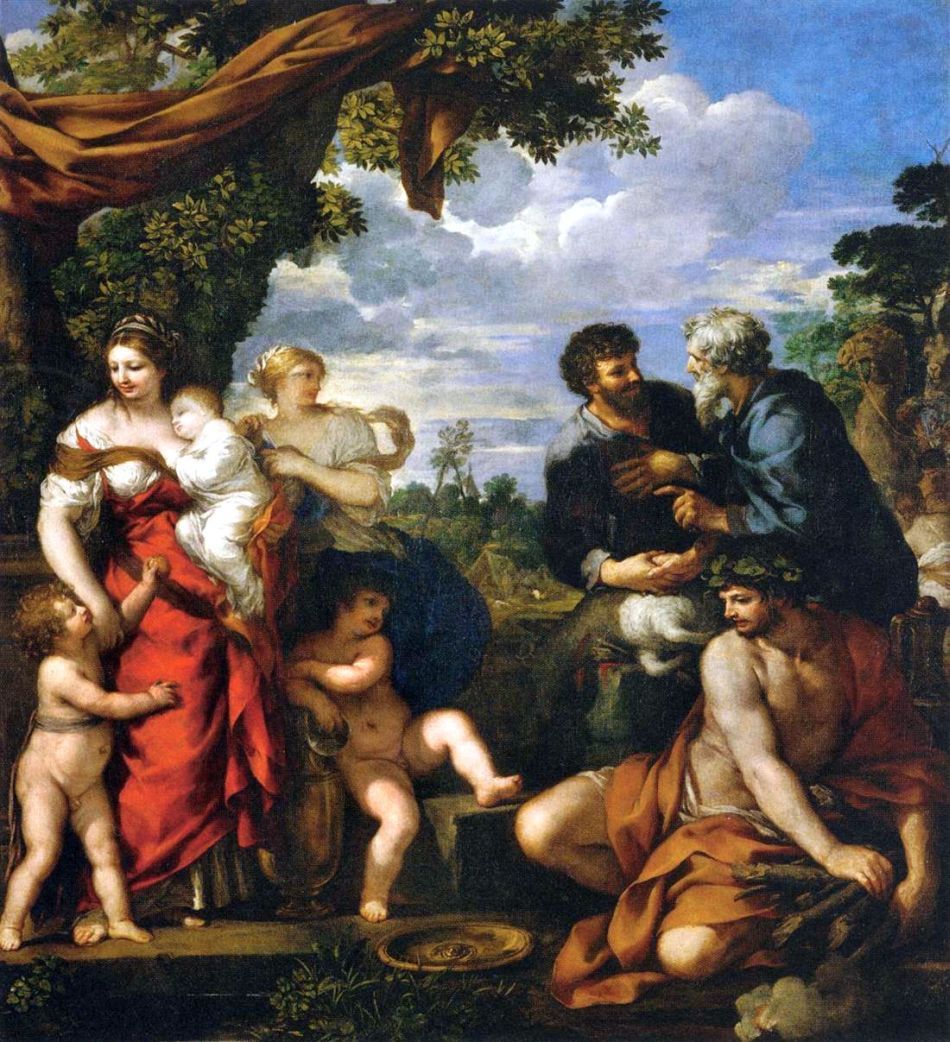
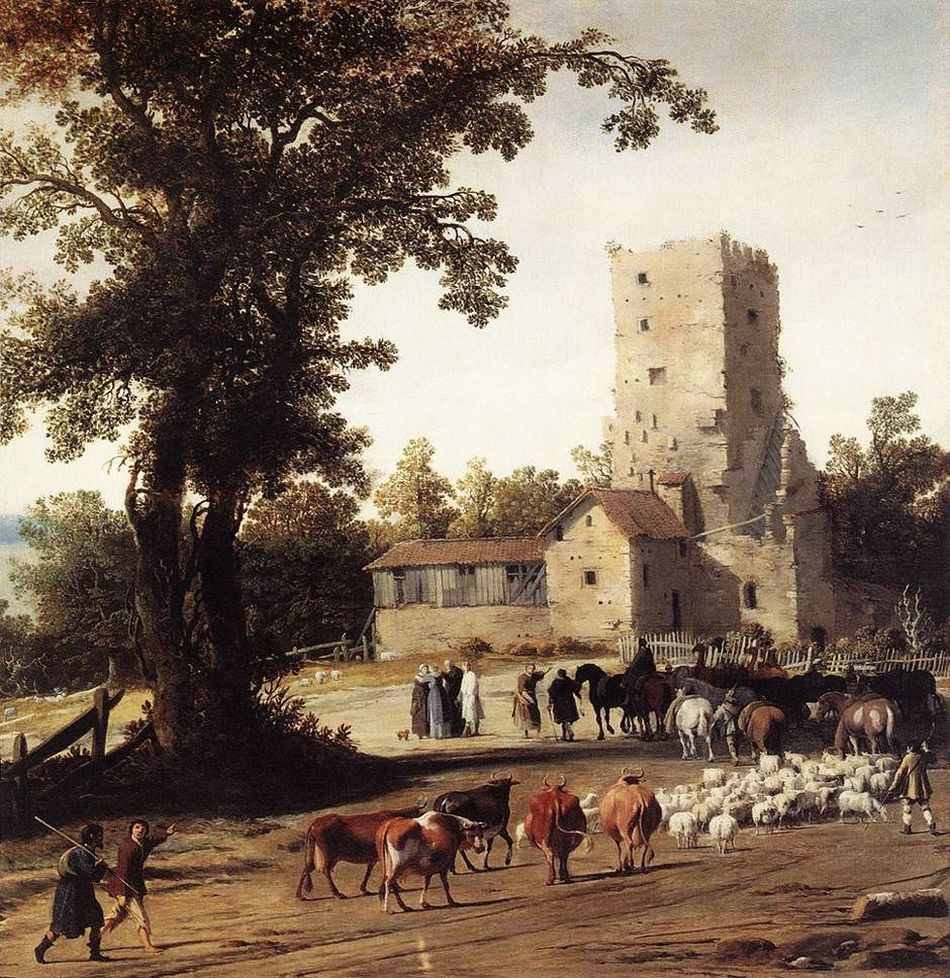
Image 1: Jacob Leading the Flocks of Laban (c. 1632)
Giovanni Benedetto Castiglione (1609-1664)
Baroque Style
Private Collection
Image Source: Web Gallery of Art
~~~~~~~~~~
Image 2: Rachel Sitting on the Idols (1726-1728)
Giovanni Battista Tiepolo (1696-1770)
Baroque Grand Manner Style
Patriarchal Palace, Udine, Udine, Italy
Image Credit: Wikipedia
~~~~~~~~~~
Image 3: Jacob Reproaching Laban (1628)
Hendrick Terbrugghen (1588-1629)
Dutch Golden Age Baroque Style, Utrecht Caravaggism School
Wallraf-Richartz Museum, Cologne, Germany
Image Credit: Web Gallery of Art
~~~~~~~~~~
Image 4: The Alliance of Jacob and Laban (1630-1635)
Pietro da Cortona (1596 or 1597 - 1669)
Baroque Style
Musee du Louvre, Paris, France
Image Source: Web Gallery of Art
~~~~~~~~~~
Image 5: Italianate Landscape with the Parting of Jacob and Laban (c. 1630)
Pieter Jansz Post (1608-1669)
Dutch Golden Age Baroque Style
Frans Halsmuseum, Haarlem, Netherlands
Image Source: Web Gallery of Art
SPECIAL NOTE:
[ I will again be working through the Scriptures from Genesis to Revelation. I will be adding links, resources, images, and the like, upgrading the former work-through which began with the 2013-10-12 posting which can be found, along with the full Genesis to Revelation postings, in the Archive Page. Postings will be at midnight Eastern Time, as I am able. However, no days will be skipped, even though a posting may be late. And all postings will be housed in the Archive Page. ]
Explanation: In Genesis 31 Jacob faced a life-changing crisis. This developed when Jacob lost the favor of Laban. In response, the LORD told him to return to his kindred and he would be with him (1-3).
Jacob then shared the problem with his wives, Rachel and Leah, and told them of the vision he had received from God in which God told him that he had seen how Laban had constantly tried to trick him. And the LORD revealed to Jacob that he had caused the marked animals to mate with the unmarked animals, thereby reversing Laban's schemes. Jacob's wives also encouraged Jacob to leave, as God told him to do, because Laban had stolen from them as well and had treated them like slave women (4-16).
Acting upon these encouragements, Jacob left secretly for his own country. But, unknown to him, Rachel had stolen Laban's household idols (17-21). Three days later, Laban discovered that Jacob was gone, and he overtook Jacob after a seven day pursuit. But God warned Laban not to say either good or bad to Jacob (22-24).
Laban then came to Jacob and asked him why he left secretly, saying that it was in his power to hurt Jacob, except that God forbade him to do so. Laban also asked Jacob why he had stolen his household gods. But Jacob challenged him to search his belongings and find his gods, and take his idols, and put the thief to death (25-32).
Laban searched, but found nothing, because Rachel had hidden them beneath the place where she was lying, claiming she could not rise because she was menstruating. This may have seemed reasonable to Laban because he believed that she would not dishonor sacred objects by sitting on them and defiling them while menstruating (33-35).
Jacob then became angry with Laban for pursuing him, making false accusations, making him bear the losses among the flocks for twenty years, changing his wages frequently, and being willing to send him away empty, if God had not intervened (36-42).
In reply, Laban said that he could do nothing to anyone because these were his daughters and his grandchildren; so he asked for a covenant in which both Jacob and Laban pledged to do no harm to one another and to have the LORD watch between them (43-50). As a witness to the covenant, Laban erected a pillar, beyond which neither would pass to do harm to the other (51-54). So Laban arose the next morning, kissed his sons and daughters, blessed them, and returned home (55).
[Interpretation of the Issues Regarding the Care of the Flocks]. The relevant material is contained in the previous chapter and in today's chapter. I will attempt to answer a series of questions and then draw a conclusion. The First Question: How, and by whom, were Laban's flocks separated from Jacob's Flocks? The separation must have been done by Jacob and Laban, with Laban taking the lead (Genesis 30:34-36). In the verses just cited, Laban speaks and acts, and Jacob is referred to in the second person. This does not mean that Jacob was not present. It is highly likely that Jacob was present and active. It was Jacob's intention to be present and to effect the separation on the very day that he and Laban reached their agreement (Genesis 30:32a - "let me pass through all your flock today"). Laban also acted that day (Genesis 30:35a - "But that day Laban removed ..." ). There would not have been sufficient time for Laban to pass through the flock and remove the marked animals without Jacob being present. Laban had agreed to allow Jacob to make the separation and to do it on the day they agreed to do it. Therefore, it is highly likely that Jacob was there, participation in the process. Neither man trusted the other. Both would have watched the other. And it is natural that Laban, being the owner of the undivided flock, would, for matters of distrust and of primacy of ownership, take the lead in the separation process. This, I believe is why Laban is mentioned as the actor, and not Jacob. Jacob was there, observing and participating in the background, I believe.
The Second Question: Who took the marked animals three days away and kept them? Some believe that Laban's sons took them and kept them. The pronoun reference in 30:35b is unclear - "Laban ... put them in the charge of his sons." At first reading, this would seem to refer to Laban's sons. However, I believe it must refer to Jacob's sons. I have just argued that Jacob was most likely present, though silent. Jacob's sons also may have been watching Laban's flock while Jacob and Laban made their bargain. Or the sons of Laban could have readily been called to participate in the separation. And, even if Laban's sons separated the marked animals and took them three days away, initially, this arrangement would have been intolerable to Jacob in the long term. Also, Laban's sons would be needed at home with Laban's flock to help keep watch on Laban's flock and on Jacob as he tended to that flock. Laban's sons would have been needed all the more at home if Jacob's sons were elsewhere tending a new flock. If Jacob's sons were three days away, they would have unable to give much help to their father.
Moreover, six years after the division, it seems likely that Laban's sons were (still) not present with Jacob's flock. If they had been present with Jacob's flock, they would have discovered Jacob's plot and revealed it to Laban immediately. The plot would probably have been undone, humanly speaking. When Jacob finally escaped, it was when Laban was shearing his sheep so that his eyes, and probably the eyes of his sons, and most of his servants, were off Jacob and on the business at hand.
The Third Question: How did Jacob's flock increase? The LORD, of course, did it, but by what means? Since the marked and the unmarked flocks were separated by three days, no opportunity would be found for interbreeding. Presumably, food and water for the flocks were in their respective areas, so they would probably not have met and interbred on occasion at some common watering spot. And, even if the flocks had a common watering spot, Laban would probably have seen to it that his flock was never exposed to Jacob's. So, with no contact between the flocks, how were marked animals conceived and born in Laban's flock? Some of Laban's flock may have had marked babies in their wombs. Jacob would have been entitled to them when they were born. However, it seems likely that these newborns would have been transferred to Jacob's flock shortly after weaning, and before they were of breeding age. This would explain why Jacob was, apparently, trying by external physical means, or by magical means, to produce marked animals from unmarked animals. He tried to do this by placing marked sticks in or near their drinking troughs when strong animals were breeding. However, if he had seen marked animals breeding with unmarked animals, it would have been unnecessary to use such means. Marked progeny would naturally result in many instances. Yet, when God revealed to Jacob how the marked progeny were conceived, he told Jacob that marked animals bred with the unmarked animals. So why did Jacob not see the markings? I believe that the "marks" that God referred to were recessive genes in unmarked animals, and that it was these animals which God sent to breed and produce marked offspring. Had the "marks" been visible, Jacob would have been able to see them. No matter how many times Laban changed the terms of the contract, limiting it to one feature then another, God always saw the relevant genetic markers, and he guided the strong among those animals to breed and to produce appropriately marked offspring. So the stronger became Jacob's, and the weaker became Laban's. Thus, by this interpretation, God's providence is not only notable, it is astounding.
Conclusion: I believe that the least problematic reading of chapters 30 and 31 is to conclude that Jacob's sons kept Jacob's flock in a place which was three days away from Laban's flock. And, even though Laban changed Jacob's wages "10 times" (literally or figuratively), he was unable to prevent Jacob's flock from increasing due to the Lord's notable blessing on Jacob. And, finally, Jacob and his family were able to escape Laban because Jacob's sons, not Laban's, were keeping Jacob's flocks at a safe distance three days removed from Laban.
[ Sermons: Sinclair B Ferguson. Robert E Bell. William Still. Various. ]
[ Illustration: Today's paintings depict the main events of today's chapter. ]
.
RESOURCES
[ THEMATICALLY AND CHRONOLOGICALLY RELATED SCRIPTURES: Genesis 31: [3] Genesis 32:9; Genesis 28:15.
[5] Isaiah 41:10.
[7] Genesis 20:6; 1 Samuel 25:26; 1 Samuel 25:34.
[8] Genesis 30:32.
[11] Genesis 48:16.
[13] Genesis 28:18; Genesis 35:14.
[24] Genesis 20:3; Matthew 1:20.
[28] Ruth 1:9; 1 Kings 19:20; Acts 20:37.
[30] Joshua 24:2; Judges 18:24; Psalm 115:4; Isaiah 44:10; Acts 19:26.
[32] Genesis 44:9.
[37] 1 Samuel 12:3; 1 Corinthians 6:5.
[39] Exodus 22:12-13.
[41] Genesis 29:18.
[44] Joshua 24:27.
[48] Genesis 21:30. -- From the KJV Reference Bible ]
[ CHRONOLOGY: GENERAL. Patriarchs (Traditional). Judges # 1. Judges # 2. Kings # 1. Kings # 2. Prophets # 1. Prophets # 2. NT # 1. NT # 2. NT # 3. ]
[ MAPS: Maps # 1. Maps # 2. Maps # 3. Maps # 4. Maps # 5. ]
[ COMMENTARIES, ETC: GENERAL: Bible Study Tools; Bible Hub: Study Light; Blue Letter Bible // PSALMS: Monergism: Precept Austin: The Treasury of David; John Gill; John Calvin - Volumes 1, 2, 3, 4, 5]
[ MUSIC: GENERAL: The Cyber Hymnal // PSALMS: Genevan Psalter (Instrumental). VARIOUS ARTISTS: Micha'el Ben David. Sons of Korah. Fernando Ortega. Janet Isaac Morrison. Music of the Bible Revealed - Suzanne Haik-Vantoura. Dr. David Erb. Gregorian Chants. ]
HARMONY OF THE LAW
HEBREW AND GREEK INTERLINEAR BIBLES
Pentateuch Detailed Outline:
Genesis Detailed Outline:
Genesis 31
9. Generations of Isaac (Ge 25:19 - Ge 35:29) - 2066 - 1886 B.C. Canaan
1 And he heard the words of Laban's sons, saying, Jacob hath taken away all that was our father's; and of that which was our father's hath he gotten all this glory.
2 And Jacob beheld the
countenance of Laban, and, behold, it was not toward him as before.
3 And the LORD said unto Jacob, Return unto the land of thy fathers, and to thy kindred; and I will be with thee.
4 And Jacob sent and called Rachel and Leah to the field unto his flock,
5 And said unto them, I see your father's countenance, that it is not toward me as before; but the God of my father hath been with me.
6 And ye know that with all my power I have served your father.
7 And your father hath deceived me, and changed my wages ten times; but God suffered him not to hurt me.
8 If he said thus, The speckled shall be thy wages; then all the cattle bare speckled: and if he said thus, The ringstraked shall be thy hire; then bare all the cattle ringstraked.
9 Thus God hath taken away the cattle of your father, and given them to me.
10 And it came to pass at the time that the cattle conceived, that I lifted up mine eyes, and saw in a dream, and, behold, the rams which leaped upon the cattle were ringstraked, speckled, and grisled.
11 And the angel of God spake unto me in a dream, saying, Jacob: And I said, Here am I.
12 And he said, Lift up now thine eyes, and see, all the rams which leap upon the cattle are ringstraked, speckled, and grisled: for I have seen all that Laban doeth unto thee.
13 I am the God of Bethel, where thou anointedst the pillar, and where thou vowedst a vow unto me: now arise, get thee out from this land, and return unto the land of thy kindred.
14 And Rachel and Leah answered and said unto him, Is there yet any portion or inheritance for us in our father's house?
15 Are we not counted of him strangers? for he hath sold us, and hath quite devoured [devouring has devoured] also our money.
16 For all the riches which God hath taken from our father, that is ours, and our children's: now then, whatsoever God hath said unto thee, do.
17 Then Jacob rose up, and set his sons and his wives upon camels;
18 And he carried away all his cattle, and all his goods which he had gotten, the cattle of his getting, which he had gotten in Padanaram, for to go to Isaac his father in the land of Canaan.
19 And Laban went to shear his sheep: and Rachel had stolen the images that were her father's.
20 And Jacob stole away unawares to Laban the Syrian, in that he told him not that he fled.
21 So he fled with all that he had; and he rose up, and passed over the river, and set his face toward the mount Gilead.
22 And it was told Laban on the third day that Jacob was fled.
23 And he took his brethren with him, and pursued after him seven days' journey; and they overtook him in the mount Gilead.
24 And God came to Laban the Syrian in a dream by night, and said unto him, take heed that thou speak not to Jacob either good or bad.
25 Then Laban overtook Jacob. Now Jacob had pitched his tent in the mount: and Laban with his brethren pitched in the mount of Gilead.
26 And Laban said to Jacob, What hast thou done, that thou hast stolen away unawares to me, and carried away my daughters, as captives taken with the sword?
27 Wherefore didst thou flee away secretly, and steal away from me; and didst not tell me, that I might have sent thee away with mirth, and with songs, with tabret, and with harp?
28 And hast not suffered me to kiss my sons and my daughters? thou hast now done foolishly in so doing.
29 It is in the power of my hand to do you hurt: but the God of your father spake unto me yesternight, saying, Take thou heed that thou speak not to Jacob either good or bad.
30 And now, though thou wouldest needs be gone [going you must go], because thou sore longedst [longing you long] after thy father's house, yet wherefore hast thou stolen my gods?
31 And Jacob answered and said to Laban, Because I was afraid: for I said, Peradventure thou wouldest take by force thy daughters from me.
32 With whomsoever thou findest thy gods, let him not live: before our brethren discern thou what is thine with me, and take it to thee. For Jacob knew not that Rachel had stolen them.
33 And Laban went into Jacob's tent, and into Leah's tent, and into the two maidservants' tents; but he found them not. Then went he out of Leah's tent, and entered into Rachel's tent.
34 Now Rachel had taken the images, and put them in the camel's furniture, and sat upon them. And Laban searched all the tent, but found them not.
35 And she said to her father, Let it not displease [blaze in the eyes of] my lord that I cannot rise up before thee; for the custom of women is upon me. And he searched, but found not the images.
36 And Jacob was wroth, and chode with Laban: and Jacob answered and said to Laban, What is my trespass? what is my sin, that thou hast so hotly pursued after me?
37 Whereas thou hast searched all my stuff, what hast thou found of all thy household stuff? set it here before my brethren and thy brethren, that they may judge betwixt us both.
38 This twenty years have I been with thee; thy ewes and thy she goats have not cast their young, and the rams of thy flock have I not eaten.
39 That which was torn of beasts I brought not unto thee; I bare the loss of it; of my hand didst thou require it, whether stolen by day, or stolen by night.
40 Thus I was; in the day the drought consumed me, and the frost by night; and my sleep departed from mine eyes.
41 Thus have I been twenty years in thy house; I served thee fourteen years for thy two daughters, and six years for thy cattle: and thou hast changed my wages ten times.
42 Except the God of my father, the God of Abraham, and the fear of Isaac, had been with me, surely thou hadst sent me away now empty. God hath seen mine affliction and the labour of my hands, and rebuked thee yesternight.
43 And Laban answered and said unto Jacob, These daughters are my daughters, and these children are my children, and these cattle are my cattle, and all that thou seest is mine: and what can I do this day unto these my daughters, or unto their children which they have born?
44 Now therefore come thou, let us make a covenant, I and thou; and let it be for a witness between me and thee.
45 And Jacob took a stone, and set it up for a pillar.
46 And Jacob said unto his brethren, gather stones; and they took stones, and made an heap: and they did eat there upon the heap.
47 And Laban called it Jegarsahadutha: but Jacob called it Galeed.
48 And Laban said, This heap is a witness between me and thee this day. Therefore was the name of it called Galeed;
49 And Mizpah; for he said, The LORD watch between me and thee, when we are absent one from another.
50 If thou shalt afflict my daughters, or if thou shalt take other wives beside my daughters, no man is with us; see, God is witness betwixt me and thee.
51 And Laban said to Jacob, behold this heap, and behold this pillar, which I have cast betwixt me and thee;
52 This heap be witness, and this pillar be witness, that I will not pass over this heap to thee, and that thou shalt not pass over this heap and this pillar unto me, for harm.
53 The God of Abraham, and the God of Nahor, the God of their father, judge betwixt us. And Jacob sware by the fear of his father Isaac.
54 Then Jacob offered sacrifice upon the mount, and called his brethren to eat bread: and they did eat bread, and tarried all night in the mount.
55 And early in the morning Laban rose up, and kissed his sons and his daughters, and blessed them: and Laban departed, and returned unto his place.
ADDITIONAL AD LIB MATERIAL: Prose, Poetry, Writers, Visual Artists, Music, DAWN, and ILLUMINATION. ILLUMINATION features a compact, Illuminated Bible. DAWN, the page you are presently visiting, features a new image and explanation daily.
Please Email Comments and Questions To
AD LIB ARTS EMAIL
copyright 2016, Scott Souza
|




